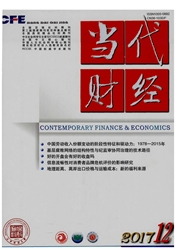

 中文摘要:
中文摘要:
作为中国金融宏观调控的重要监测分析指标,地区社会融资规模准确反映了金融体系对地区实体经济支持力度。然而,资金配置过程中由于其逐利属性使得社会融资存在明显的地域歧视现象,并诱导地区出现非效率投资问题。通过构建社会融资地域歧视测度模型,实证研究发现:经济发展水平越高,社会融资规模越大,即社会融资存在向经济发达地区集聚的特征;社会融资规模与融资需求不相关,表明社会资金并未配置到需求最高的地区。在上述研究基础上,对各地区的非效率投资进行测度,并研究社会融资的地域歧视对非效率投资的影响,结果发现:社会融资的地域歧视越严重,地区非效率投资越多。其中,社会融资中的信贷融资地域歧视引发了投资不足,而社会融资中债券和股票融资的地域歧视则会诱导地区过度投资。
 英文摘要:
英文摘要:
As an important analysis monitors of China's financial macro-control indicators, the scale of regional social financing accurately reflects the financial system support to the region's real economy. However, due to its advantage to pursue profit in the process of allocation of funds, social financing has obvious geographical discrimination feature, and has a huge impact on the regional capital allocation efficiency. By constructing social financing region discrimination measurement model, the empirical analysis results shows that higher economic development lead to a larger social financing scale, namely social financing have the trend to gather in the economically developed areas, which confirms the existence of discrimination in the social financing. Social financing scale and the financing needs have no significant correlation, indicating that China's social financing is not configured to areas most in need of funds. In addition, this paper use the inefficiency investment level to measure the efficiency of capital allocation, study the effect of social financing of regional discrimination on the efficiency of capital allocation. The result shows that the overall social financing geographical discrimination will cause regional underinvestment, the financing of social credit financing leads to insufficient investment in regional discrimination, while bond financing and stock financing geographical discrimination will lead to regional excessive investment.
 同期刊论文项目
同期刊论文项目
 同项目期刊论文
同项目期刊论文
 期刊信息
期刊信息
